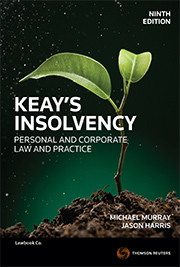“in a daily newspaper circulating generally”

Our ’21st century’ corporate insolvency courts have reintroduced a 19th century rule requiring liquidators and others to place notices in ‘daily newspapers’ which ‘circulate’, and more. 2017 In 2017, the ‘superior’ federal and state courts have or are reintroducing the need for the publication of various corporate insolvency events, such as the winding up […]
‘WTF’ – five years of tax returns not lodged!

Upon being told in 2102 by his accountant, D, that his company’s business activity statements had not been lodged for 5 years, since 2007, the director responded: “guys … WTF I was under the understanding that we were only behind for the last 3 or 4 not since I started. [M] can you please set […]
QUT Law Review – a special issue on personal insolvency

Australia’s current major bankruptcy law reforms are necessarily informed by a range of academic and professional input, from here and overseas. Papers from QUT’s major international personal insolvency conference in 2016 have just been published in the QUT Law Review, including a new account of details of the bankruptcy of our former Chief Justice, Sir […]
The legislative challenge of facilitating climate change adaptation for biodiversity

The need for our laws to facilitate increasing climate change adaptations for Australia’s biodiversity was the subject of the winning essay for the annual prize of the Academy of Law for 2017. The prize – $10,000 – was presented to Ms Phillipa McCormack, of the University of Tasmania, at a ceremony at the Federal Court […]
Safe harbour for directors of corporate groups? An UNCITRAL initiative

UNCITRAL’s Insolvency Working Group V is meeting in Vienna next month to discuss the preparation of guidance for directors of corporate groups in the period of a group’s financial uncertainty and approaching insolvency. Do our new laws assist? UNCITRAL’s initiative involves an extension of Part 4 of UNCITRAL’s Legislative Guide on Insolvency Law – […]
‘If you want to take us on in court, go for your life because, guess what …’

ASIC may not have meant it but comments to the recent PJC inquiry about ASIC’s “transformational industry funding” may raise some concerns. Mr Medcraft said, that “already people are starting to realise the impact of it. If you want to take us on in court, go for your life because, guess what, next time we […]
ASIC and the PJC – hellholes, law enforcement, identity, funding, and more

Here are some selected snippets from the transcript of the PJC hearing oversighting ASIC, of 27 October 2017, the last for Mr Medcraft in his ASIC role. Many other issues were covered, including whistleblowing, financial advice, insurers, and scam emails. The selected items covered here are: harmful but legal conduct – sometimes it takes a […]
Guerilla tactics needed against phoenix misconduct

While the government is considering the various submissions on phoenix reforms, these quick thoughts came to mind, involving both government and computer selected liquidators, bankruptcy, public access to data, silo approaches, and modern slavery. And battle terminology. The pervasive impact of phoenix and corporate misconduct continues to come up in a range of inquiries – […]
Bankruptcy remuneration challenge referred to mediation – Groll

Justice Jennifer Davies of the Federal Court has referred bankruptcy trustees’ remuneration to mediation, following a challenge by the trustees to the Inspector-General in Bankruptcy’s reduction in the amount of remuneration claimed. The Court has listed the matter for hearing on 14 and 15 December 2017, and Justice Davies has directed that any mediation […]
A less than “radical change” to Australia’s court structure

Given the Attorney-General’s openness to “radical change” in the structure of Australian courts, one small but significant reform would be to revive the idea of having judges jointly appointed to both the Federal and the relevant Supreme Court. This arises out of the pending unsatisfactory issue of benches comprising three Full Federal Court judges and […]
Insolvency practitioner independence – a ‘fair-minded’ or ‘uncharitably-minded’ assessment

The most recent decision on insolvency practitioner independence confirms an ongoing trend of treating the fair-minded observer, whose view is determinative, of being more knowledgeable than in the past. The 2014 appeal decision in Walton Constructions; ASIC v Franklin[1] concerned issues of independence of administrators arising from the source of their appointment. The Full Federal […]
ASIC’s 2016-17 Report – insolvency practitioners

ASIC’s 2016-2017 annual report has been released. The following comments focus on the report’s comments on ASIC’s oversight of liquidators at pp 66-68 of the report, including *ASIC’s winding up of 6 abandoned companies, helping 4 employees owed $240k in unpaid entitlements; **ASIC’s funding of 1 liquidator to recover assets and ban 34 directors; ***ASIC […]
Shifting the Dial – not far enough for insolvency and phoenixing

The Productivity Commission’s report – Shifting the Dial – is a valiant attempt to move us out of the comfort zones of many assumptions about what can and can’t be done in commerce and society generally. Its recommendation [2.5] on how pharmacy services might be revolutionised is a dramatic example. Insolvency But in my focus […]
Our new insolvency law – how on earth did it all happen?

Australia’s new insolvency laws – introduced by the Insolvency Law Reform Act 2016 – are in place and the task is to understand and apply them. They are not legally difficult. But they have been described in dramatic terms by eminent commentators as the worst insolvency reforms in 30 years; some may say the worst […]
A History of Australian Legal Education, by David Barker

I was pleased to have attended the recent book launch of A History of Australian Legal Education written by my colleague Professor David Barker. The book examines the history and development of legal education in Australia by tracing the establishment of university law schools and other forms of legal education in the States and Territories […]
Australian Academy of Law

I am honoured to have been elected a director of the Australian Academy of Law at its AGM on 25 September 2017, having been a Fellow of the Academy since 2014. My colleague Dr Nuncio D’Angelo was also elected as the other new board member. The work of the Academy is evident in the range […]
How to be ethical in the practice of the law: can it be taught?
This open debate, organised by the Australian Academy of Law, is the final in a series of three ethics-themed debates held in Sydney this year. Previous debates have attracted a wide audience of around 200 people. It is being held from 5:30–7pm on Monday 20 November 2017, at the Federal Court of Australia in Sydney. […]
Bankruptcy – for a whole year?!

“The degree of civilization in a society can be judged by entering its prisons.”[1] I would not go so far as to say that some reactions to the government’s proposed reduction in the 3 year period of penal servitude for bankruptcy to 1 year is an indicator of the degree of Australian civilisation. But it does support a view […]
Why does the Federal Circuit Court not have corporate insolvency jurisdiction?
This is not a plug for the Federal Circuit Court of Australia, which sits below the Federal Court, but it asks why it has not been given corporate insolvency jurisdiction under the Corporations Act. The unsatisfactory answer to that is suggested at the end of this article. Apart from its extensive family law and child […]
Where’s an economist when you need one?

R3 in the UK has commented on a recent OECD Report, about which we gave some views when it came out, in July 2017. As R3 says, the OECD report has concluded that the UK’s insolvency and restructuring framework is the most effective at “preventing a build-up of productivity-sapping zombie companies”, those “struggling companies aged […]
Other constitutional restrictions on our politicians – treason, and bankruptcy

This commentary need not distract us from the important issue being heard by the High Court on Tuesday 10 October 2017, as to the eligibility of certain members of parliament to remain in office. But it is interesting to look at the other restrictions under our Constitution – treason, understandably, but also bankruptcy. The impending […]
Codes of conduct
Codes of conduct need to remain in step with on-going changes in the commercial and business worlds in which they operate. Otherwise they lose their relevance and purpose. That could then lead to a point where compliance with a Code is found to be contrary to the law, for which sanction may be meted. In […]
Keay – phoenix reforms

It is good to see that that several reform issues raised in my and Jason Harris’ textbook, Keay’s Insolvency, appear in the government’s anti-phoenix paper – as to a government liquidator, and funding of liquidators; dealing with abandoned companies; a focus on preventive rather than reactive regulation; and even down to the adoption of bankruptcy […]
Surveillance /səˈveɪl(ə)ns/

“close observation, especially of a suspected spy or criminal”: Oxford Dictionary. In relation to professional and industry regulation, as relevant, a website count of the regulators’ use of the term “surveillance” shows these numbers: AFSA 3 ATO 29 FMA NZ 35 APRA […]

